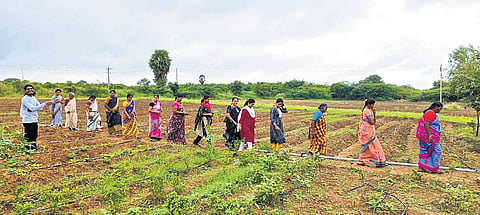

ANANTAPUR: In the drought-prone district of Anantapur, where farming losses have driven many families to despair, a quiet revolution is taking root. A group of widows, abandoned wives, and single mothers—are cultivating not just crops, but hope, dignity, and economic independence, thanks to a collective natural farming initiative led by the REDS voluntary organisation.
Left powerless by the suicides of their husbands’ or social abandonment, these women are emerging as symbols of strength and self-reliance. Without chemicals or pesticides, they grow a variety of vegetables, fruits, greens, and millets—providing produce to locals and building sustainable livelihoods.
At Kurugunta in Anantapur rural mandal, REDS has leased eight acres of farmland. Under the banner Mana Bhoomi – Women Collective Natural Farming, women such as C Alivelamma (whose husband committed suicide), Chowdamma, Lakshmidevi, K Ratnamma, Gangamma, and C Peddakka—all widows or single women—cultivate the land. REDS provides the investment for seeds and essentials, while the women retain full rights over the produce and profits.
Each woman has a different story, but together, they have formed a united front against poverty and dependency. A dedicated WhatsApp group links them to urban buyers in Anantapur, sharing daily harvest updates. Their chemical-free, freshly harvested produce is in high demand. The death of husband often leads to financial and emotional paralysis for rural a women. REDS founder Bhanuja recognised this deep crisis and created a platform that goes beyond temporary relief.
By leasing land and initiating collective farming, the organisation offers steady employment, food security, and renewed self-worth. The women began with millets—low-cost, climate-resilient crops—and soon diversified into vegetables and fruits for year-round income. This shift from seasonal to continuous farming marked a turning point in their lives.
Through government support, REDS empowered women to revive millet farming using rare seeds and natural methods, restoring traditional practices, boosting self-confidence, and transforming them into independent farmers and role models.
“I was born at sunrise, and my father named me Bhanuja, believing I would bring light to our home,” said the visionary behind the movement. Hailing from Badavadlapalli in Sri Sathya Sai district, Bhanuja’s own journey has been shaped by struggle and activism. Raised by a father who was a Communist and poet, she grew up in ideologies of resistance and social justice. Despite being married early, Bhanuja never allowed her spirit to be confined. She began volunteering with Young India during high school and went on to establish REDS in 1996, driven by a mission to support women, children and environmental causes. From rescuing trafficked women and forming DWCRA self-help groups to combating forest degradation, her activism remained same. Through Mana Bhoomi, Bhanuja and REDS have transformed barren land into a thriving model of empowerment.